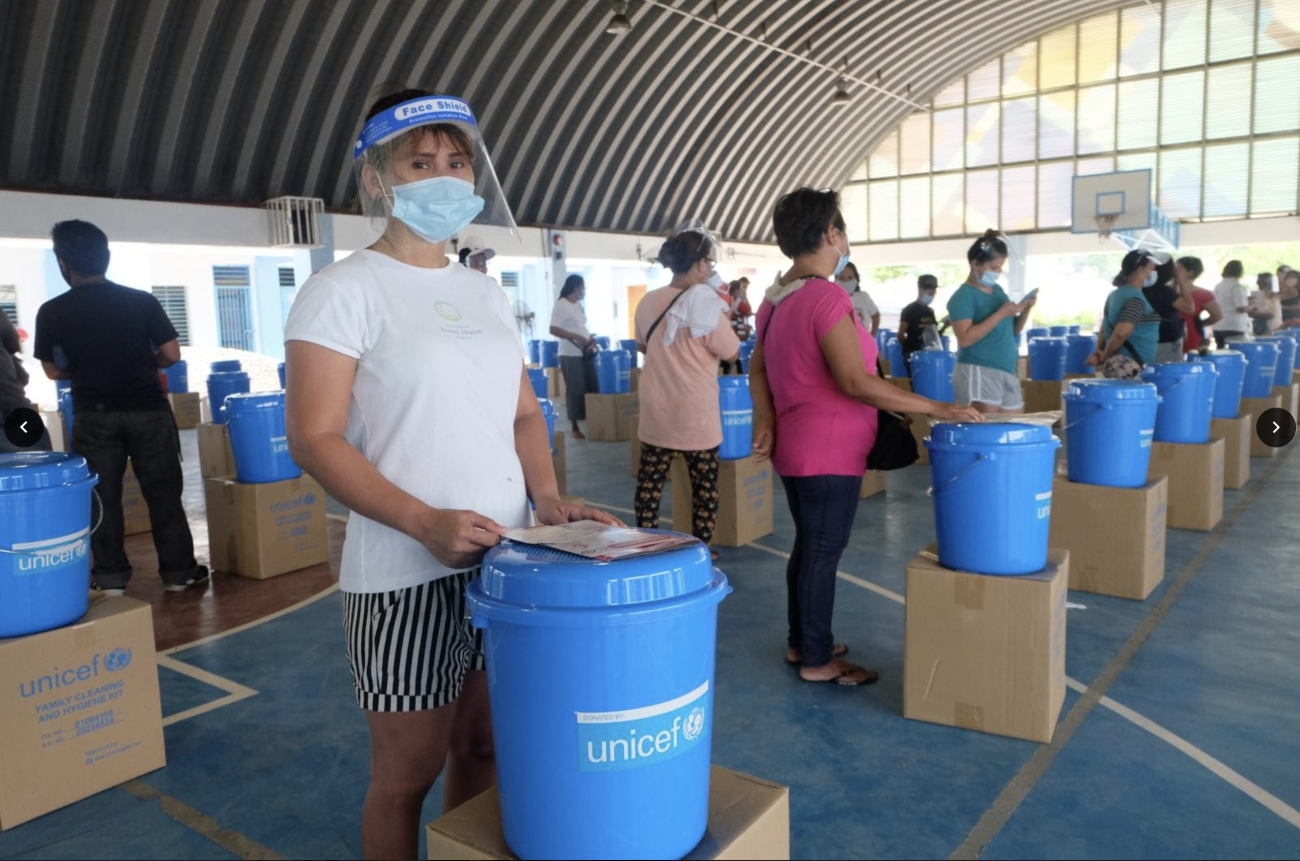Families heavily affected by COVID-19 receive hygiene kits

UNICEF, in partnership with the Philippine Red Cross, provided 300 of hygiene kits to 1,498 people in Bgys. Sto. Niño, Malanday, and Tumana in Marikina City
August 28 wasn’t a typical day for Jihan Meliton, a 38-year-old mother of six, as she lined up with 90 others to receive their family cleaning and hygiene kits at the community gymnasium of Bgy. Sto, Niño.
UNICEF, in partnership with the Philippine Red Cross, provided 300 of these kits to 1,498 people in Bgys. Sto. Niño, Malanday, and Tumana in Marikina City as part of its COVID-19 response.
Before the pandemic crippled the livelihoods of many people in the country, Jihan’s husband earned around PHP500 (US$10) a day from his job as a welder-electrician. On her part, Jihan helped by selling any merchandise she could find such as used clothing. That was on a good day, she says, but there were times when they barely had enough for their basic needs.
It’s been almost half a year since strict quarantine measures have been imposed and Jihan says they rarely have good days.
“Sometimes, we only have loose change and we don’t reach 500 pesos,” she sighs. “We just try to help each other in the community when we can.”
Jihan’s family is among almost 4 million poor households nationwide receiving assistance from the national government through a conditional cash transfer program. Dubbed the 4Ps for Pantawid Pamilyang Pilipino Program (Bridging Program for the Filipino Family), it provides a modest monthly grant for education and health and nutrition.
For the most part, Jihan says the assistance has been helpful. But with six children, ages 6 to 18, and an indefinite pause on their livelihood, staying optimistic has been difficult.
So when she got word that her family was one of the selected recipients of the hygiene kits, she was grateful for the assistance with the essential supplies they need to protect themselves against the coronavirus.
According to Jennifer de Guzman, Administrator of the Red Cross Marikina Chapter, they chose the three barangays to receive the kits because they have the highest numbers of COVID-19 cases in the city, a high poverty rate, and a high concentration of informal settlers.
“With the help of the barangay officials, we selected those who are most vulnerable,” she says. “Since the supplies are limited, we made the selection per sector to represent abused women, solo parents, the elderly who are taking care of their grandchildren, and persons with disabilities.” Most of the recipients are jobless and are beneficiaries of the 4Ps like Jihan’s family.
Since the supplies are limited, we made the selection per sector to represent abused women, solo parents, the elderly who are taking care of their grandchildren, and persons with disabilities.
-- Jennifer de Guzman, Administrator of the Red Cross Marikina Chapter
In partnership with UNICEF, Unilever Philippines joins this round of distribution by providing soaps and laundry powder for the family cleaning and hygiene kit adapted for the COVID-19 response. The adapted kit contains soaps, laundry powder, isopropyl alcohol, bleach, rubber gloves, washable face masks for adults and children, and a bucket with dipper for collecting and storing water.
When asked how her family has been coping in the pandemic given the increased importance of personal hygiene, Jihan says they were fortunate to have been provided with piped water in the community before the pandemic which proved critical in avoiding infection.
“I tell my children to bathe regularly and always wash their hands before eating,” she says as she glances at the hygiene kits with anticipation.
As of 31 August, UNICEF Philippines and partners have provided critical water, sanitation and hygiene services and supplies to:
6,105 people in NCR and BARMM who received 1,238 water kits;
5,144 people in NCR and BARMM who received 1,200 hygiene kits;
9,325 high-risk people in North Cotabato who received 1,865 hygiene kits and 40 hands-free handwashing facilities
72 healthcare facilities that received 496 disinfection kits
cleaning staff who received 2,000 PPE sets; and
2,148 sanitary engineers and inspectors, including healthcare workers, who joined the online infection prevention and control for cleaning and disinfection

